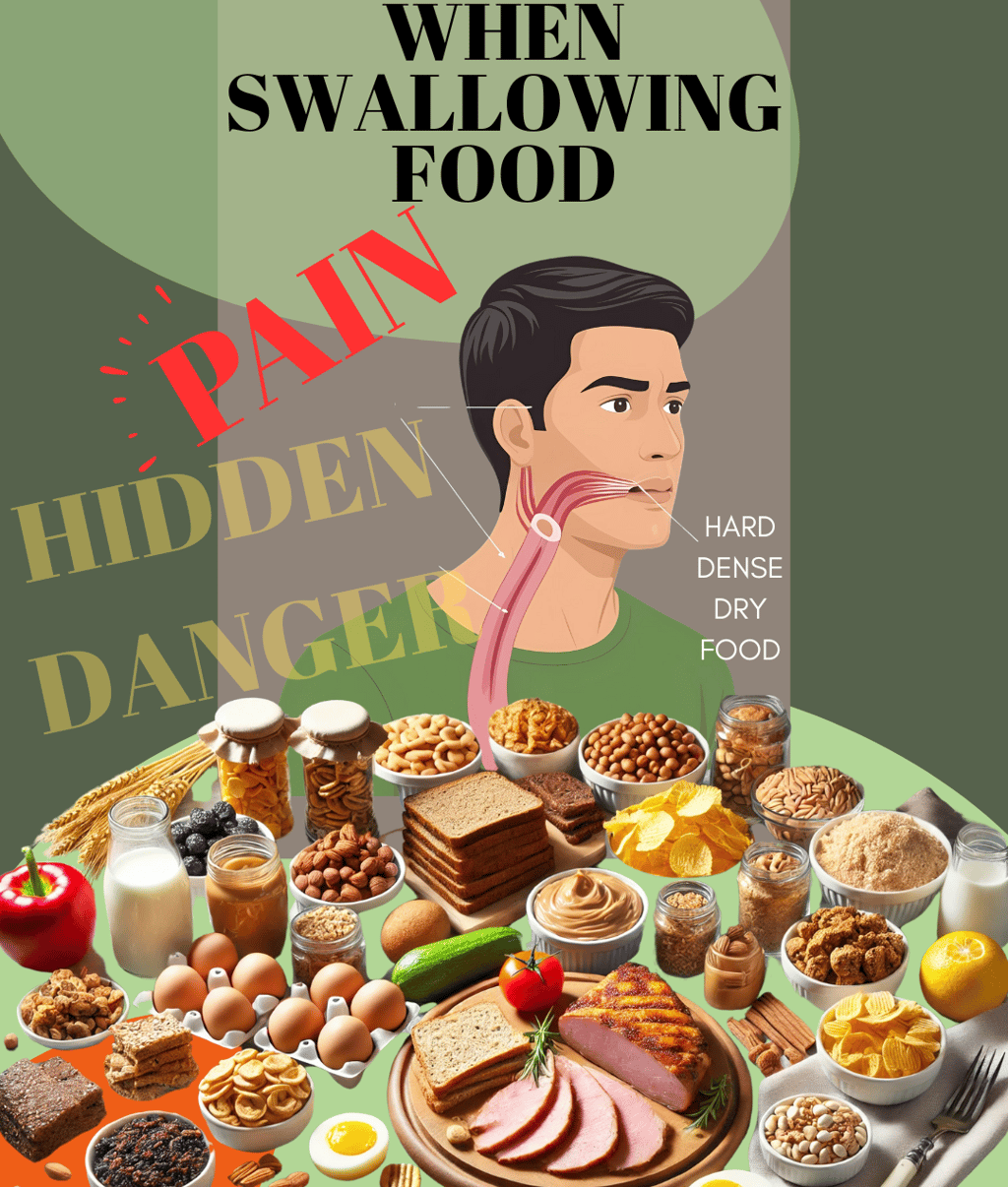PAIN WHEN SWALLOWING FOOD
Why Solid, Dense, or Dry Foods Cause Pain When Swallowing: Risks and Solutions
WELLNESS
AURACANVA
3/2/2025
----- Disclosure: This post contains affiliate links and may feature ads. As an Amazon Associate, I earn from qualifying purchases. -----


Why Solid, Dense, or Dry Foods Cause Pain When Swallowing: Risks and Solutions
Understanding the Pain When Swallowing Solid or Dry Food
Swallowing should be a smooth and painless process. However, for some, eating solid or dry food can lead to discomfort or pain when the food passes through the esophagus. This condition, known as odynophagia, may indicate an underlying issue with the esophagus or swallowing mechanism.
Why Does Solid or Dry Food Cause Pain When Swallowing?
Lack of Moisture: Dry foods, like bread, crackers, or hard-boiled eggs, can absorb saliva and become difficult to swallow.
Esophageal Irritation or Inflammation: Conditions like acid reflux, esophagitis, or infections can make the esophagus sensitive to solid foods.
Narrowing of the Esophagus (Stricture): Scar tissue from acid reflux or other conditions can cause the esophagus to narrow, making swallowing painful.
Dysphagia: This swallowing disorder affects the muscles or nerves involved in the swallowing process.
Esophageal Spasms: Involuntary contractions of the esophagus can cause pain when swallowing.
Foreign Body Sensation: Sometimes, dry food can feel stuck or scrape the lining of the esophagus, causing discomfort.
Potential Dangers of Pain When Swallowing
If not addressed, difficulty swallowing solid or dry food could lead to:
Choking: Dry or solid food may get stuck in the throat or esophagus, leading to a choking hazard.
Esophageal Damage: Sharp or hard food may scratch or damage the lining of the esophagus.
Aspiration: Food particles entering the airway can cause coughing, choking, or in severe cases, aspiration pneumonia.
Malnutrition or Dehydration: If pain when swallowing leads to reduced food or fluid intake.
Foods to Be Cautious With
Certain foods are more likely to cause discomfort when swallowing:
Dry Foods: Bread, crackers, pretzels, cookies.
Dense Proteins: Hard-boiled eggs, chicken breast, steak.
Sticky Foods: Peanut butter, bread without moisture.
Hard Foods: Chips, nuts, granola, raw vegetables.
Remedies to Prevent Pain and Avoid Danger
Moisten Dry Foods: Dip bread in soup, add sauces to meats, or blend dry foods with liquids.
Chew Thoroughly: Take small bites and chew food until it is completely broken down.
Stay Hydrated: Drink water before, during, and after meals to help food pass smoothly.
Avoid Irritating Foods: Acidic, spicy, or very hot foods can worsen esophageal irritation.
Change Food Texture: Switch to softer or pureed foods if needed.
Posture and Eating Habits: Sit upright while eating and avoid lying down immediately after meals.
Medical Help: If pain persists, see a healthcare professional. They might recommend tests, such as an endoscopy, to identify underlying causes.
When to See a Doctor
If you experience persistent pain, difficulty swallowing, frequent choking, or weight loss, consult a healthcare provider to rule out serious conditions.
Conclusion
While occasional discomfort when swallowing dry or solid food may not be alarming, chronic or severe pain could signal an underlying issue. With proper care and attention to diet and eating habits, you can reduce the risk of pain and enjoy meals comfortably.
